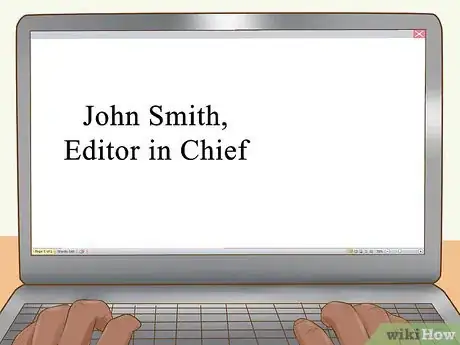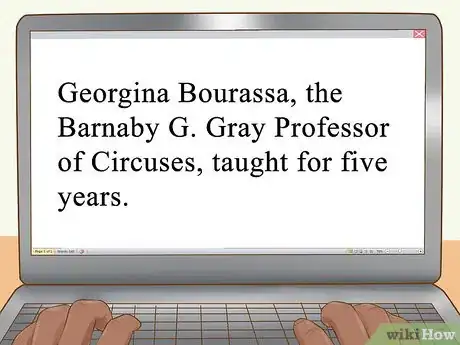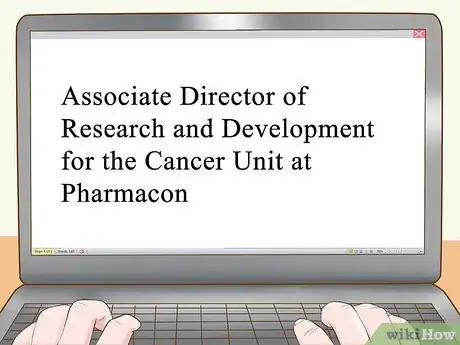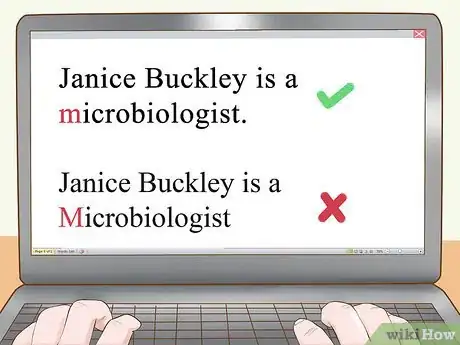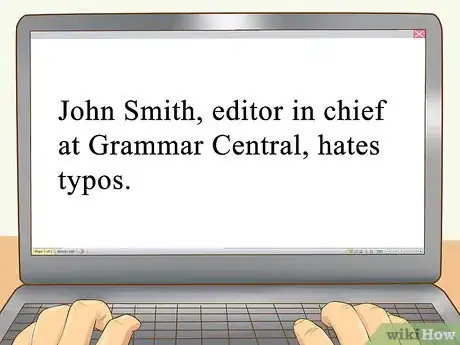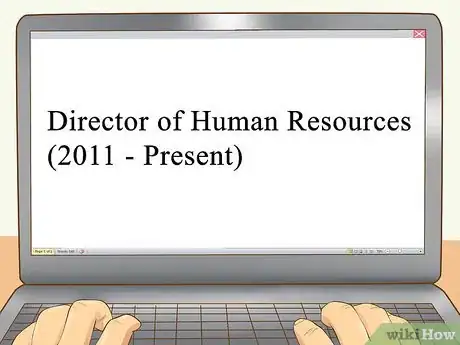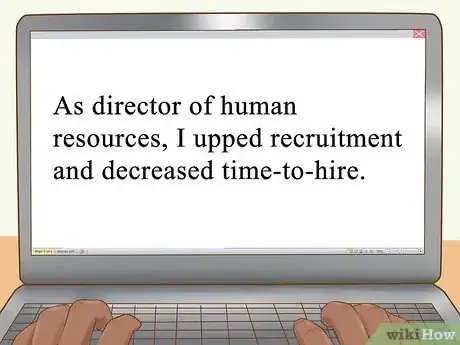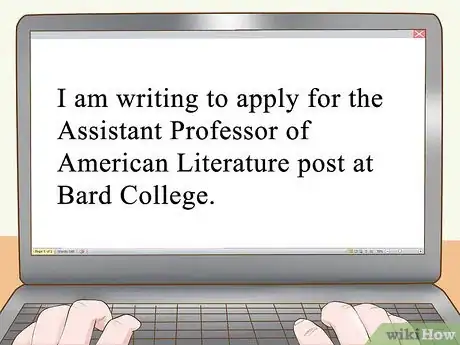This article was co-authored by Katherine Kirkinis, Ed.M., MA. Katherine Kirkinis is a Career Coach and Psychotherapist who has served as a career expert for Forbes, Medium, Best Life, and Working Mother Magazine, and as a diversity and inclusion expert for ATTN and Quartz. She specializes in working with issues of career, identity, and indecision. She has doctoral-level training in career counseling and career assessment and has worked with hundreds of clients to make career decisions through career assessments. She is pursuing a doctoral degree at The University of Albany, SUNY where her work focuses on diversity and inclusion, racism in the workplace, and racial identity. She is a published author and has been featured in academic journals as well as popular media outlets. Her research has been presented at 10+ national APA conferences since 2013.
There are 7 references cited in this article, which can be found at the bottom of the page.
wikiHow marks an article as reader-approved once it receives enough positive feedback. In this case, 94% of readers who voted found the article helpful, earning it our reader-approved status.
This article has been viewed 196,284 times.
The rules of grammar are always tricky to master, especially since there are so many of them, and they all seem to come with plenty of exceptions. Like the rest of English grammar, the rules for capitalizing job titles can often be confusing. However, most of the time, there’s no call for uppercase. If you take a little time to learn the few cases in which capitalization applies, you can be confident that you can write any job title correctly.
Steps
Understanding Which Job Titles to Capitalize
-
1Capitalize proper nouns.[1] This is the most general rule of capitalization. It means that you should use uppercase for the unique names of specific entities (like “Paris,” “Saturn,” “Alex,” or “Green Peace”) but lowercase for “common nouns” that refer to a class of entities (like “city,” “planet,” “baseball player,” or “environmental organization”). In the case of job titles, this means that most job titles are not capitalized.[2]
- However, a title that refers to an official, one-of-a-kind position, like the “Queen of England,” should be capitalized.
-
2Capitalize job titles that precede someone’s name. If a specific title comes immediately before a name and refers to a specific person, it’s usually part of a proper noun, and therefore usually should be capitalized. That is, “reverend James” should be “Reverend James,” and “doctor Smith” should be “Doctor Smith” or “Dr. Smith.”[3]
- Note that this rule only holds true for titles that have been officially conferred or awarded. For instance, you would capitalize, “Professor Anita Brown,” “Judge Regina Blake,” and “President Flora Barnum,” but you would not capitalize titles like “artist,” “race car driver,” or “musician,” as in, “This song is performed by musician Louis Armstrong.”
- Another way to determine if a job immediately preceding a person’s name should be capitalized is to consider if it’s a title or a description. That is, “Director of Marketing Joanna Russell” is correct if that’s Joanna’s official title. If you’re only describing her position, you wouldn’t capitalize her job: “marketing chief Joanna Russell.”[4]
Advertisement -
3Capitalize job titles when signing your name. At the end of a letter, email, or other messages, your job title should be capitalized. Instead of signing off as “John Smith, editor in chief,” your signature line should read “John Smith, Editor in Chief.”[5]
-
4Capitalize titles when they’re used in lieu of a name. If you are using a person’s title as a replacement for their name, especially when directly addressing them, you should capitalize it.[6]
- For example: “Can you make it to my graduation, Dad?” or “With all due respect, General, I disagree,” or “I saw the Queen of England ride by today.”
- This rule also holds true for terms of respect, like “Your Honor” or “Your Highness”.
-
5Use uppercase with endowed positions. Some titles of jobs like endowed professorships or fellowships are proper nouns because they are one-of-a-kind. Because the job titles in this case are proper nouns, be sure to capitalize them even when they’re written after a person’s name.
- For instance, “Georgina Bourassa, the Barnaby G. Gray Professor of Circuses, taught for five years.”
-
6Remember to use title case when capitalizing. That is, always capitalize the first, last, and principal words in a title, but don’t capitalize unimportant words like prepositions (such as, “of,” “about,” or “with”), conjunctions (such as, “and,” “but,” or “or”), or articles (“a,” “an,” or “the”).[7]
- For example, “associate director of research and development for the cancer unit at Pharmacon” should be: “Associate Director of Research and Development for the Cancer Unit at Pharmacon.”
- Networks (like ESPN) and journalism outlets (such as CNN) are great resources for determining which words should or should not be capitalized in a title.
Knowing When to Keep Titles in Lowercase
-
1Don't capitalize unofficial titles or common nouns. When the job title refers to a profession or class of jobs rather than to a specific or official title, do not put it in uppercase.[8]
- For instance, “Janice Buckley is a microbiologist,” or “Here are some tips from painter John Green.” In both cases, these job titles are being used to describe a profession rather than an official title, so they shouldn’t be capitalized.
-
2Do not capitalize a title that’s on its own. If a title is isolated from any names and used as a standalone noun in a sentence, it should not be capitalized.[9] This is the most common use-case for job titles, which means that they most often don't require uppercase.[10]
- For example, “John, who is a salesperson, works at the dealership,” or “The clerk helped us with the documents.”
-
3Use lowercase when the title comes after a person’s name in a sentence. This is true whether or not the title is specific or general, official or unofficial.[11]
- For example: “Jesse Roberts, editor in chief at Grammar Central, hates typos,” or “Helena Briggs, social worker with the NHS, is handling the case.”
Capitalizing Titles in Job Application Materials
-
1
-
2Do not capitalize job titles in the body text of your resume.[14] If a job title appears as part of a sentence or paragraph of your resume, for instance, in the summary or in a job description, do not use uppercase. For example: "As director of human resources, I upped recruitment and decreased time-to-hire."[15]
-
3Be consistent with your capitalization of official job titles in cover letters. There’s no consensus about whether you definitely should or should not capitalize specific, official job titles when they appear in your cover letter. The important thing is to decide which way to go and be consistent throughout the text.[16]
- When you are applying for a specific position, many people are inclined to put that job title in uppercase in their cover letters: “I am writing to apply for the Assistant Professor of American Literature post at Bard College.” If you do, be sure that you capitalize the other specific job titles included in your letter.
- The best way to help you decide which way to go is to look at the company’s job listing and website to see if they capitalize specific job titles that appear within sentences or not. If they do, then you should, too.
- Either way, remember that you should never capitalize general job titles in a sentence, such as, “I have more than twenty years of experiences as a director of human resources,” or “I am looking for a position as a campaign manager in the nonprofit sector.”
Expert Q&A
Did you know you can get expert answers for this article?
Unlock expert answers by supporting wikiHow
-
QuestionShould I capitalize a job title in a cover letter?
 Katherine Kirkinis, Ed.M., MAKatherine Kirkinis is a Career Coach and Psychotherapist who has served as a career expert for Forbes, Medium, Best Life, and Working Mother Magazine, and as a diversity and inclusion expert for ATTN and Quartz. She specializes in working with issues of career, identity, and indecision. She has doctoral-level training in career counseling and career assessment and has worked with hundreds of clients to make career decisions through career assessments. She is pursuing a doctoral degree at The University of Albany, SUNY where her work focuses on diversity and inclusion, racism in the workplace, and racial identity. She is a published author and has been featured in academic journals as well as popular media outlets. Her research has been presented at 10+ national APA conferences since 2013.
Katherine Kirkinis, Ed.M., MAKatherine Kirkinis is a Career Coach and Psychotherapist who has served as a career expert for Forbes, Medium, Best Life, and Working Mother Magazine, and as a diversity and inclusion expert for ATTN and Quartz. She specializes in working with issues of career, identity, and indecision. She has doctoral-level training in career counseling and career assessment and has worked with hundreds of clients to make career decisions through career assessments. She is pursuing a doctoral degree at The University of Albany, SUNY where her work focuses on diversity and inclusion, racism in the workplace, and racial identity. She is a published author and has been featured in academic journals as well as popular media outlets. Her research has been presented at 10+ national APA conferences since 2013.
Career Coach & Psychotherapist
-
QuestionIn a policy or process document, my understanding is that you should capitalize a title if the title is used to refer to a specific person/entity in lieu of using their name and title. Does this apply?
 DonaganTop AnswererThat's a good rule to follow.
DonaganTop AnswererThat's a good rule to follow. -
QuestionDo I capitalize general surgeon, podiatrist and family practice in a resume?
 Community AnswerIf you are using these titles in headings (for instance, when you list your professional experience), they should be capitalized. When using them anywhere else in the body text of the resume, they should not be capitalized. See Method 3 for more information.
Community AnswerIf you are using these titles in headings (for instance, when you list your professional experience), they should be capitalized. When using them anywhere else in the body text of the resume, they should not be capitalized. See Method 3 for more information.
Warnings
- The conventions for capitalization may change depending on your geographic location or even your industry. For instance, there are differences between the U.S. and U.K. as well as between biologists and journalists. Be sure that you’re aware of which conventions to go by when you’re writing something for a specific audience.⧼thumbs_response⧽
- If you’re writing something for work, check to see if there is a company or organizational style guide that you can use as a reference to look up their preferences as to capitalization.⧼thumbs_response⧽
References
- ↑ Katherine Kirkinis, Ed.M., MA. Career Coach & Psychotherapist. Expert Interview. 14 October 2020.
- ↑ https://www.cu.edu/university-relations/capitalization
- ↑ https://www.grammarbook.com/blog/capitalization/capitalization-with-job-titles/
- ↑ http://www.dailywritingtips.com/avoid-capital-offenses-when-using-job-titles/
- ↑ http://grammar.yourdictionary.com/capitalization/capitalization-of-job-titles.html
- ↑ http://www.dailywritingtips.com/avoid-capital-offenses-when-using-job-titles/
- ↑ http://www.grammar-monster.com/lessons/capital_letters_title_case.htm
- ↑ https://www.cu.edu/university-relations/capitalization
- ↑ Katherine Kirkinis, Ed.M., MA. Career Coach & Psychotherapist. Expert Interview. 14 October 2020.
- ↑ http://www.dailywritingtips.com/avoid-capital-offenses-when-using-job-titles/
- ↑ http://www.dailywritingtips.com/avoid-capital-offenses-when-using-job-titles/
- ↑ Katherine Kirkinis, Ed.M., MA. Career Coach & Psychotherapist. Expert Interview. 14 October 2020.
- ↑ https://www.linkedin.com/pulse/3-rules-capitalization-resumes-jim-giacomo-giammatteo
- ↑ Katherine Kirkinis, Ed.M., MA. Career Coach & Psychotherapist. Expert Interview. 14 October 2020.
- ↑ https://www.linkedin.com/pulse/3-rules-capitalization-resumes-jim-giacomo-giammatteo
- ↑ Katherine Kirkinis, Ed.M., MA. Career Coach & Psychotherapist. Expert Interview. 14 October 2020.
About This Article
If you're not sure when to capitalize a job title, always capitalize a title that comes immediately before a name, such as "Dr Smith" or "Reverend James." Additionally, you should capitalize your job title at the end of an email, such as by writing "John Smith, Editor-in-Chief." However, you shouldn't capitalize a profession rather than a specific title, like "Here are some tips from painter John Green." You should also avoid capitalizing titles that appear on their own, like "the clerk helped us." For tips on when to capitalize job titles in your resume or job application, keep reading!



